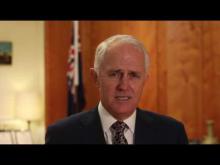Working with Aboriginal and Torres Strait Islander people for a better Australia

This year we mark important milestones in the relationship between Aboriginal and Torres Strait Islander people and the Australian Government.
It is 50 years since the 1967 Referendum which saw Australians overwhelmingly agree the Commonwealth had a duty to make laws to benefit our First Australians.
The past year saw the 50th anniversary of the Wave Hill Walk Off, in which Gurindji people petitioned the Governor-General for the return of some of their traditional land, and the 40th anniversary of the passage of Aboriginal land rights legislation for the Northern Territory.
In June last year I was honoured to hand the title deeds for some 52,000 hectares of land on the Cox Peninsula near Darwin to the Larrakia people as part of the Kenbi land claim settlement. Theirs is a story that epitomises the survival and resilience of our First Australians, and of the Larrakia people.
This ninth Closing the Gap report showcases real successes being achieved across the country—by individuals, communities, organisations and government.
For example, in response to the Prison to Work Report, we are collaborating nationally to explore ways to support reintegration of Indigenous prisoners into communities, address the barriers to employment and improve the coordination of services across and within all jurisdictions.
We have taken great strides in progressing financial independence for Indigenous Australians through the Commonwealth’s Indigenous Procurement Policy. In its first year, 493 Indigenous businesses were awarded $284.2 million in Commonwealth contracts. State and territory governments have agreed to explore similar policies in their own jurisdictions and the Indigenous business sector will continue to grow.
While we celebrate the successes we cannot shy away from the stark reality that we are not seeing sufficient national progress on the Closing the Gap targets. While many successes are being achieved locally, as a nation, we are only on track to meet one of the seven Closing the Gap targets this year. Although we are not on track to meet the ambitious targets we have set, we must stay the course.
We will continue to focus on key priorities—from preconception and the early years through school, providing a positive start to life, which of course opens opportunities for further study and employment. The high rates of suicide and disproportionately high rates of incarceration among our First Australians are issues that all governments, in partnership with community, need to work tirelessly to resolve.
We have listened to calls from the community. We will not shy away from our goal of supporting equal opportunity for First Australians. This is our national responsibility. Our commitment to the end goal will not waiver, but we must do things differently. We must build on what is working, and change what isn’t working.
Twelve months ago, when I tabled my first Closing the Gap report in Parliament, I made a commitment that my Government would do things with Aboriginal and Torres Strait Islander people, not do things to them and I am pleased to say we have made some real gains in that regard.
We are building a new way of working together with Indigenous leaders and their communities to create local solutions—putting Aboriginal and Torres Strait Islander people at the centre of decision-making in their regions.
As I have said before, our greatest strides in Closing the Gap will come when we work together—all levels of government, business and the community.
The Empowered Communities model is now in eight regions across the country, in addition to other local decision-making models such as the Murdi Paaki Regional Assembly in western New South Wales. Over the coming year we will continue to build the capacity and capability of communities and government to truly engage with each other and to jointly make informed decisions.
As part of the Government’s commitment to enable Indigenous leaders to develop local solutions, we have a responsibility to measure the success or otherwise of our policies and programs, and adjust where needed. And sharing this knowledge and evidence with communities enables local decision-making. We need to be patient and acknowledge that these things take time—but we are determined to get it right.
We must also recognise culture as paramount to finding solutions that respect, acknowledge and support identity.
We are on a path of an ambitious reform agenda for Indigenous affairs. Changing the way in which Governments work together, and with communities to deliver better outcomes.
I am heartened that we have bipartisan support to improve the wellbeing of our First Australians, and that the Council of Australian Governments (COAG) has recently agreed to work together, and with Indigenous Australians, to refresh the Closing the Gap agenda, emphasising collaboration and acknowledging that one size does not fit all.
With the tenth anniversary of Closing the Gap approaching in 2018, it is timely to look at what we have learned. What has worked and where we need to focus efforts to drive greater change. Over the decade there has been greater collaboration and national focus on Indigenous outcomes than ever before. This will continue, this must continue.
Last year, as part of my commitment to bring Indigenous Affairs to the forefront of government, I established the Indigenous Policy Committee of Cabinet. The Committee will support better engagement with Cabinet Ministers, their portfolios and Aboriginal and Torres Strait Islander people, including through collaboration with the Indigenous Advisory Council.
With the term of the inaugural Prime Minister’s Indigenous Advisory Council having recently ended, I take this opportunity to thank all Council members for their hard work and dedication to improving the lives of Australia’s First Peoples. I look forward to building on that legacy with the new members for the Council’s second term.
As Aboriginal and Torres Strait leaders have said for a long time, it is not all about what you seek to achieve, it is equally about how you achieve it. The ends we seek from our efforts are non-negotiable; the means by which we achieve them can differ but must always be in concert with the wishes of Indigenous people.
The Hon Malcolm Turnbull MP
Prime Minister of Australia

